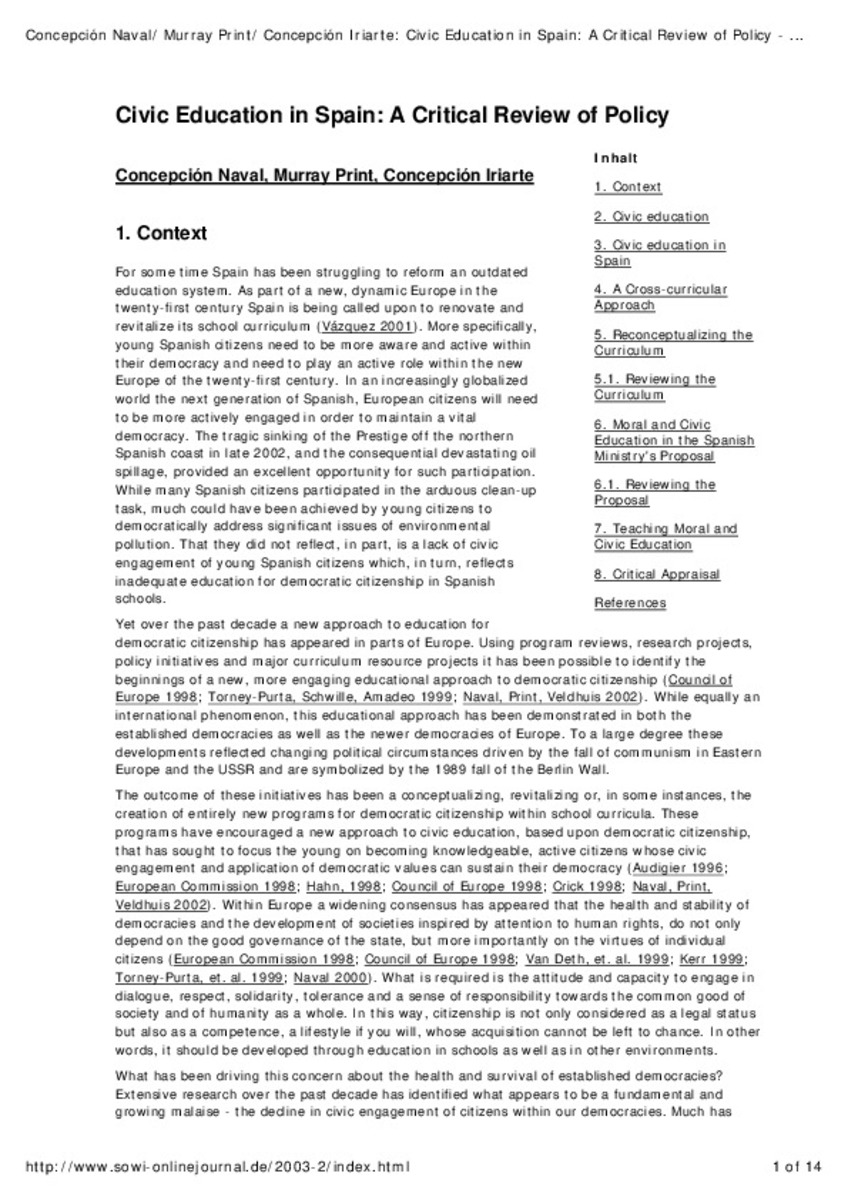Full metadata record
| DC Field | Value | Language |
|---|---|---|
| dc.creator | Naval, C. (Concepción) | - |
| dc.creator | Print, M. (Murray) | - |
| dc.creator | Iriarte-Redín, C. (Concha) | - |
| dc.date.accessioned | 2012-02-16T12:05:22Z | - |
| dc.date.available | 2012-02-16T12:05:22Z | - |
| dc.date.issued | 2003 | - |
| dc.identifier.citation | Naval, C., Print, M., Iriarte, C. (2003). ""Civic education in Spain: a critical review of policy"". Journal of Social Science Education, 2003-2 | es_ES |
| dc.identifier.issn | 1618-5293 | - |
| dc.identifier.uri | https://hdl.handle.net/10171/20890 | - |
| dc.description.abstract | The international revival in civic education over the past decade did not have a pervading impact on the Spanish education system. Unlike efforts in Britain, many former communist countries and democracies in other parts of the world such as Australia, Spanish efforts to invigorate education for democratic citizenship have been modest. Nevertheless there has been a growing interest and an increasing realization that Spain is part of a new, more democratic Europe which needs civic education for its young people to enhance democratic citizenship. For example, the 1990 General Law for the Regulation of the Spanish Educational System (LOGSE) included Civic Education as part of the planned educational reform for Spain at the end of the Twentieth century. Our objective is to critically analyze the Civic and Moral Education program proposed by the Spanish Ministry of Education, in 1990, from its earliest formulations, including the modifications that have been incorporated until 2001. The legal texts and orders issued by the ministry (MEC: Ministerio Español de Educación y Ciencia) during the specified period were analyzed. Published bibliography presenting the theoretical basis of the proposal, as well as the references concerning its implementation, were also studied. We conclude that despite these efforts in educational reform, if Spain wants to see itself, educationally, as part of the new Europe, it will need to engage a more vigorous program in civic education for democratic citizenship. Currently young people in Spain are not well prepared for active, democratic citizenship in the new Europe and an increasingly globalized world | es_ES |
| dc.language.iso | eng | es_ES |
| dc.publisher | Sowi-Online e.V. | es_ES |
| dc.rights | info:eu-repo/semantics/openAccess | es_ES |
| dc.subject | Civic Education | es_ES |
| dc.subject | Spain | es_ES |
| dc.subject | Cross-curricular approach | es_ES |
| dc.subject | Curriculum | es_ES |
| dc.subject | Moral and Civic Education | es_ES |
| dc.subject | Formal curriculum | es_ES |
| dc.subject | Informal curriculum | es_ES |
| dc.subject | Extra curriculum | es_ES |
| dc.subject | MEC | es_ES |
| dc.subject | LOGSE | es_ES |
| dc.subject | Democratic citizenship | es_ES |
| dc.subject | Educational system | es_ES |
| dc.subject | Regional autonomy | es_ES |
| dc.subject | Education for citizenship | es_ES |
| dc.subject | Educational reform | es_ES |
| dc.subject | Basic Curriculum Design | es_ES |
| dc.subject | Education Plan of the School (PEC) | es_ES |
| dc.subject | Curriculum Plan (PC) | es_ES |
| dc.title | Civic education in Spain: a critical review of policy | es_ES |
| dc.type | info:eu-repo/semantics/article | es_ES |
| dc.relation.publisherversion | http://www.jsse.org/2003/2003-2/spain-naval.htm | es_ES |
| dc.type.driver | info:eu-repo/semantics/article | es_ES |
Files in This Item:
Statistics and impact
Items in Dadun are protected by copyright, with all rights reserved, unless otherwise indicated.






